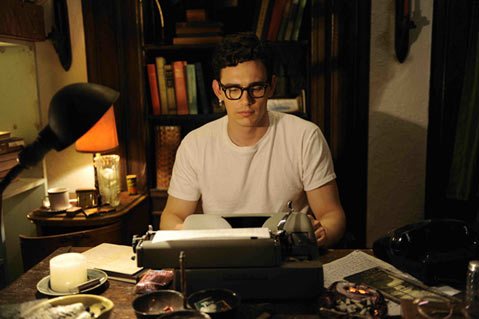Howl
Film About Allen Ginsberg’s Poem Tries Valiantly But Ultimately Fails

Sure, in the expressive scheme of things, poetry can be cinematic, and film can be poetic. But how does cinema approach the substance and mystery of poetry? That’s the underlying question and problem of Howl, which valiantly—but ultimately emptily—attempts to deal with Allen Ginsberg’s classic, epic beat poem “Howl.”
In effect, writer-directors Rob Epstein and Jeffrey Friedman rely on the concept of montage to tell the tale and try to bring its power to the screen. The film freely mixes tidbits of courtroom drama, biopic snapshotting, a faux interview with the poet, and embarrassingly silly animated pieces and ill-fitting emo music (though by the fine composer Carter Burwell), attempting to illustrate themes and imagery in the poem in question.
And some of the grit and eloquence of The Poem does filter through the gloss. This rambling, beatnik-ized Whitman-esque 1955 poem is heard recited in fragments through this mosaic-style film by the poet (James Franco) in a humble San Francisco back room. The poem was, of course, Ginsberg’s early peak, his masterpiece, and also the source of his day in court on obscenity charges (although his publisher, Lawrence Ferlinghetti, was the one charged). No doubt, the courtroom drama and free speech debate it triggered helped make “Howl” as mythic as it became, as similar circumstances did for James Joyce’s Ulysses.
There are brief, epigrammatic attempts to get at the various forces working on Ginsberg, from his unsatisfying “straight” job in advertising to his mother’s and his own experiences in the “loony bin,” his affair with mythic merry prankster Neal Cassady, and literary alliance with Jack Kerouac. But mostly, the filmmakers admirably try to dodge biopic tricks or tragedy-tapping biz (such as we saw in Sylvia). They try to keep the focus on and around “Howl,” and that unique poem-to-film translation ambition wins points for effort, even if the end result lacks rhyme of vision.



